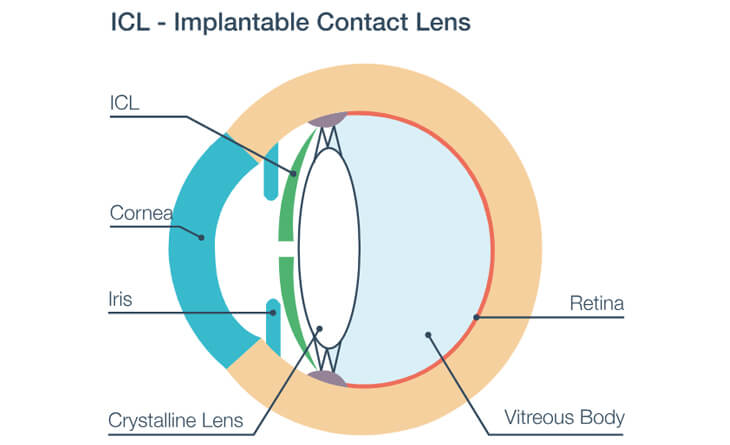Is ICL Surgery Safe?
ICL surgery is considered one of the safest and most effective ways to correct refractive errors.
Implantable collamer lens (ICL) surgery has arisen as an innovative alternative for those seeking clear and stable vision without eyeglasses. However, as with any surgery, a common question arises: Is ICL surgery safe?
In this blog, we will explore what ICL surgery is, its safety profile and its benefits and considerations. So, keep reading!

What is ICL Surgery?
Before moving forward with the safety profile, we will first understand what ICL surgery is.
ICL surgery involves permanently inserting a micro-thin collamer lens made from biocompatible material into the eye to correct refractive errors, including nearsightedness, farsightedness, and astigmatism.
Unlike LASIK surgery, ICL does not involve the removal of corneal tissue. During the procedure, your eye doctor will enter the anterior part of your eye through a small cut on the cornea.. After that, the ICL lens is carefully placed behind the iris. This specialized lens collaborates with the eye’s existing lens to refract light onto the retina, resulting in improved clarity of vision.
Safety Profile of ICL Surgery
Implantable collamer lens surgery is known for its safety profile, and a key component of this assurance lies in the careful preoperative evaluation process. This comprehensive assessment involves various tests and examinations of your eye health, evaluates your candidacy for ICL, and identifies any potential risk factors.
Measuring the anterior chamber depth and space behind the iris: The ICL requires appropriate space within the eye to operate effectively. Measuring anterior chamber depth and space behind the iris ensures that the lens may be inserted securely without damaging the anatomy of the eye.
White to white diameter and exact power of the ICL to be inserted: Tests are done to calculate the exact power and type of ICl to be fit inside your eye to give the best results.
Eye Pressure: Elevated intraocular pressure is a significant risk factor for glaucoma, and ICL implantation can sometimes increase IOP. Pre-operative evaluation helps determine if your IOP is within a safe range for surgery.
Medical History: Certain medical conditions, such as diabetes or autoimmune disorders, can also increase the risk of complications after surgery. A thorough medical history assessment helps your eye specialist in Delhi identify any potential concerns that can interfere with ICL surgery.
Post-Operative Care
Here are some post operative care that you can take after your ICL surgery to eliminate the risk:
Take Proper Rest: Your eyes have undergone a delicate procedure; therefore, you need to prioritize rest and allow them to heal properly. You should avoid strenuous activities and heavy lifting for the first few days.
Wear Protective glasses: Wearing protective glasses for the first week helps prevent accidental touch or scratches.
Avoid Eye Contact With Water: Avoid showering or swimming for the first few days to prevent the risk of infection. Gentle splashing on your face is okay, but avoid direct contact with the operated eye.
Use Prescribed Eye Drops: Your doctor will prescribe eye drops to promote healing and prevent infection. Use them as instructed, even if your eyes feel fine.
Avoid Touching or Rubbing Your Eyes: You might experience some pain or discomfort for the first two days. But you should not touch or rub them as it can increase complications.
Implantable collamer lens surgery is a safe and effective method for vision correction, and the key to ensuring its safety lies in the thorough preoperative evaluation process. Consulting an eye specialist like Dr Anisha Gupta can help you understand the safety protocols and make an informed decision.



